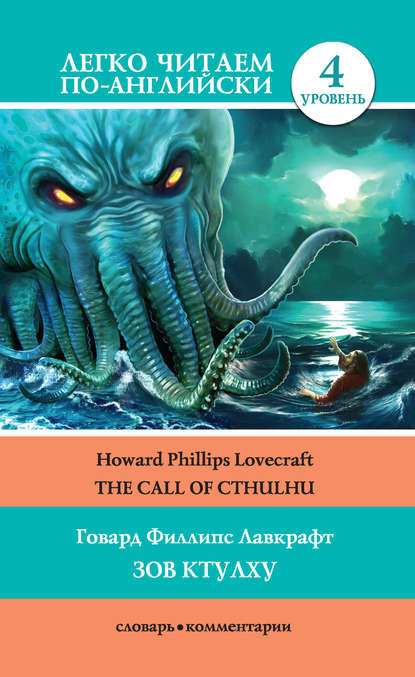
Полная версия
Пятнадцатилетний капитан / Dick Sand. A Captain at Fifteen. Уровень 2
“But you have no reason to suppose, Captain Hull, that Vernon ever owned a dog?”
“I never heard of it,” said the captain; “but the dog knows these letters. Look at the animal, madam! It does not only read the letters for himself, but invites us to come and read them with him.”
Whilst Mrs. Weldon was watching the dog with much amusement, Dick Sand asked the captain whether the traveller Vernon started on his expedition quite alone.
“That is really more than I can tell you, my boy,” answered Captain Hull.
Meanwhile Negoro quietly appeared on deck. The dog caught sight of the cook and began to bristle with rage. Negoro withdrew immediately to his room.
The incident did not escape the captain’s observation.
“No doubt,” he said, “there is some mystery here.”
“Don’t you think, sir, it’s strange that this dog knows the alphabet?”
“My mamma told me about a dog whose name was Munito, who could read as well as a schoolmaster, and could play dominoes,” said Jack.
Mrs. Weldon smiled.
“I am afraid, my child, the dog’s master, who was a clever American, taught Munito some curious tricks.”
“The more I think of it, the more strange it is,” said Captain Hull; “Dingo evidently has no acquaintance with any other letters except the two S V. Some circumstance which we cannot guess made the animal familiar with them.”
“What a pity Dingo cannot talk!” exclaimed the apprentice.
Chapter VI
A Whale
The dog’s manners repeatedly formed a subject of conversation between Mrs. Weldon, the captain, and Dick. The young apprentice does not trust Negoro, although the man’s conduct in general gave no grounds for suspicion.
Dingo soon gained the reputation of the cleverest dog in the world.
“Perhaps Dingo can,” suggested Bolton, the helmsman, “some fine day predict which way the wind lies.”
“Ah! why not?” assented another sailor; “parrots talk, and magpies talk; why can’t a dog? I think it is easier to speak with a mouth than with a beak.”
“Of course it is,” said Howick, the boatswain; “but who knows a talking dog?”
Thus Dingo became a hero. On several occasions Captain Hull repeated the experiment with the blocks, invariably with the same result; the dog never failed.
But Cousin Benedict took no interest in that.
“You cannot suppose,” he said to Captain Hull, after various repetitions of the trick, “that dogs are the only animals endowed with intelligence. Rats, you know, always leave a sinking ship, and beavers invariably raise their dams before the approach of a flood. And insects! Are not the structures of ants the very models for the architects of a city? And cannot fleas go through a drill and fire a gun as well as the artillerymen? This Dingo is not very interesting. Perhaps one day or other it may be identified as the ‘canis alphabeticus[16]’ of New Zealand.”
Anyway, Dingo was regarded as a phenomenon. This feeling was not shared by Negoro. He studiously avoided the animal, and Dick Sand was quite convinced that the cook’s hatred of the dog became still more intense.
This portion of the Pacific is almost always deserted. It is out of the line of the American and Australian steamers.
Sometimes white petrels congregated near the schooner; and sometimes petrels with brown borders on their wings came in sight.
On the day the wind shifted, Mrs. Weldon was walking up and down on the “Pilgrim’s” stern, when her attention was attracted by a strange phenomenon. Both Dick and Jack were standing close behind her, and she cried, -
“Look, Dick, look! The sea is all red. Is a seaweed making the water so strange?”
“No,” answered Dick, “it is not a weed; it is what the sailors call whales’ food. These are innumerable myriads of minute crustacea.”
“Crustacea,” replied Mrs. Weldon, “but they must be so small that they are mere insects. Cousin Benedict no doubt will like to see them.”
She called aloud, -
“Benedict! Benedict! Come here! We have here something interesting for you.”
The amateur naturalist slowly emerged from his cabin followed by Captain Hull.
“Ah! Yes, I see!” said the captain; “whales’ food; just the opportunity for you, Mr. Benedict, to study one of the most curious of the crustacea.”
“Nonsense!” ejaculated Benedict contemptuously; “utter nonsense!”
“Why? What do you mean, Mr. Benedict?” retorted the captain.
“Are you not aware, sir, that I am an entomologist?”
Captain Hull was unable to repress a smile, and turning to Mrs. Weldon, he continued, -
“When a whale gets into the middle of them it just opens its jaws, and, in a minute, hundreds of thousands of these minute creatures are inside the fringe or whalebone around its palate.”
Then they heard a shout from one of the sailors,”A whale!”
“There’s the whale!” repeated the captain. He hurried to the bow, followed by all the passengers. Even Cousin Benedict took a share in the general interest.
There was no doubt about the matter. An unusual commotion in the water showed the presence of a whale. Captain Hull and his crew gazed at the animal.
The captain’s eye soon enabled him to observe a column of water and vapour from the nostrils. “It isn’t a real whale,” he said; “the whale’s spout is small and rises high in the air. Dick, tell me, what do you think about it?”
With a critical eye Dick Sand looked long and steadily at the spout.
“I think it is a finback, sir,” said the apprentice, “But it is a very large finback.”
“Seventy feet, at least!” rejoined the captain.
“What a big fellow!” said Jack.
“Yes,” said the boatswain; “this one, if only we can get him, will fill our empty barrels.”
“Rather rough work, you know,” said Dick, “to attack a finback!”
“You are right, Dick,” answered the captain.
“But the profit is worth the risk, captain, isn’t it?”
“You are right again, Dick,” replied Captain Hull, and as he spoke, he clambered on to the bowsprit in order to get a better view of the whale.
The crew were as eager as their captain. They scanned the movements of their prey in the distance.
“Mamma!” cried little Jack, “I want to see a whale close, quite close, you know.”
“And so you will, my boy,” replied the captain, who was standing by. He turned to his crew,
“My men! What do you think? Remember, we are all alone; we have no whalemen to help us; we must rely upon ourselves. I can throw a harpoon; what do you say?”
The crew responded with a ringing cheer,
“Ay, ay, sir! Ay, ay!”
Chapter VII
Preparations for an Attack
Great was the excitement, and the question of an attempt to capture the sea-monster became the theme of conversation. The captain lost no time. He knew that the pursuit of a finback was always a matter of some peril.
The weather was excellent for the enterprise. The sea was calm, and the wind was moderate. The captain said,”Now, Dick, I am going to leave you for a few hours: while I am away, I hope that it will not be necessary for you to make any movement whatever. However, you must be on the watch. It is not very likely, but it is possible that this finback may carry us out to some distance. If so, you will follow us; and in that case, I am sure you may rely upon Tom and his friends for assistance.”
The negroes assured the captain of their willingness to obey Dick’s instructions, they were ready for immediate action.
The captain went on, “The weather is beautifully fine, Dick; but you must not leave the ship. If I want you to follow us, I will hoist a flag on the boat-hook.”
“You may trust me, sir,” answered Dick.
“All right, my lad; keep a cool head and a good heart. You are second captain now, you know!”
Dick blushed, and the bright flush spoke more than words.
“I can trust the lad,” murmured the captain to himself; “he is as modest as he is courageous.”
The captain was aware of the danger to which he was exposing himself, but his fisherman’s instinct was very keen. And so he finally prepared to start.
“I wish you all success!” said Mrs. Weldon.
“Many thanks!” he replied.
“Sometimes,” said Cousin Benedict, “sometimes there are strange insects on the backs of these great mammifers.”
“You will soon see them yourself,” was the captain’s reply.
As Captain Hull descended the rope-ladder[17] and took his place in the front of the boat, Mrs. Weldon and all on board renewed their good wishes.
The captain’s voice came from the retreating boat,
“Dick, one eye on us, one on the ship!”
“Ay, ay, sir,” replied the apprentice.
Dingo broke out into a piteous howl. The dog was standing erect. To the superstitious sailors, the howling was not reassuring. Even Mrs. Weldon was startled.
The animal walked slowly up to Mrs. Weldon, and began to lick her hand.
“Ah!” muttered old Tom, shaking his head solemnly, “a bad omen.”
And the dog gave a savage growl.
Negoro appeared and saw the ferocious attitude of the dog. The lady was quite unable to pacify the animal, which wanted to fly upon the throat of the cook, but Dick Sand called out loudly,
“Down, Dingo, down!”
The dog obeyed. Negoro turned very pale, and made his way cautiously back to his own quarters.
“Hercules,” said Dick, “keep your eye[18] upon that man.”
“Yes, I will,” he answered.
The whale-boat became a speck upon the water.
Chapter VIII
A Catastrophe
Captain Hull knew the difficulty of the task. He wanted to approach to the whale from the leeward. He had perfect confidence in his boatswain.
“We mustn’t show ourselves too soon,” he said. “Now, my lads, as quietly as you can.”
The sailors were avoiding the least unnecessary noise.
The boat now glided stealthily on to the greasy surface of the reddened waters. The whale seemed utterly unconscious of the attack that was threatening it, and allowed the boat to come nearer.
Another half-hour elapsed, and the huge body of the whale was between the boat and the “Pilgrim.”
“Slowly, my men,” said the captain, in a low voice; “slowly and softly!”
The captain took the harpoon. He stood prepared to plunge his weapon into the mass that rose above the surface of the sea.
“Are you ready, my lads?” whispered he.
“Ay, ay, sir,” replied Howick, speaking as gently as his master.
“Then, alongside at once,” was the captain’s order.
In a few minutes the boat was only about ten feet from the body of the whale. The animal did not move. Was it asleep? In that case there was hope that the first stroke might be fatal. But it was no time for speculation; the moment for action arrived.
Captain Hull seized his weapon, and hurled it against the side of the finback.
“Backwater![19]” he shouted.
The sailors pushed back with all their might, and the boat in an instant was beyond the range of the creature’s tail.
“See; there’s a youngster!” exclaimed Howick.
Captain Hull knew that the whale would defend “her little one.”
The whale was diving downwards almost perpendicularly. Its calf followed it; very soon, it began to swim along under water with great rapidity.
Captain Hull and Howick had sufficient opportunity to see the whale. It was at least eighty feet from head to tail, its colour was yellowish-brown, with numerous spots of a darker shade.
The pursuit commenced. The whale-boat darted like an arrow along the surface of the waves.
But the boat could not keep pace with the whale. The whale did not moderate its speed.
“Confound it![20]” exclaimed the captain; “the animal is dragging us away from the ‘Pilgrim’. But sooner or later, however, it must come to the surface; the whale is not a fish, you know.”
He and his companions began to look serious. Then they observed a slight slackening in the tension.
“Thank Heaven!” cried the captain; “the beast is tired at last.”
He cast his eye towards the “Pilgrim”. It was a long distance, but when he hoisted the flag on the boat-hook, he saw that Dick Sand and the negroes at once began to get as near as possible to the wind.
Meantime, the whale rose to the surface of the water. It remained motionless, waiting for its calf. Captain Hull ordered his men to pull towards the whale as rapidly as they could.
“Now, my lads!” shouted the captain. “Look out! No false shots! Are you ready, Howick?”
“Quite ready, captain,” answered the boatswain.
“It looks suspicious,” said the captain; “but go on! straight ahead!”
Captain Hull was becoming more excited every moment.
The whale only turned round a little in the water. It was evidently still looking for its calf. All of a sudden it gave a jerk with its tail which carried it some few yards away.
The men were all excited. Was the beast going to escape again?
But no: the whale merely turned, and now was rapidly beating the water with its enormous fins.
“Look out, Howick, it’s coming!” shouted Captain Hull.
The boat swerved to avoid the blow. There was a sudden pause. The whale spouted up two gigantic columns of blood and water, lashed its tail, and renewed its angry attack upon the boat.
“Bale away, men!” cried the captain.
The sailors set to work, they were baling with all their might. Captain Hull cut the harpoon-line, because the whale made no further attempt to escape. It was going to fight desperately to the very end.
There was no alternative but to face the encounter. The whale caught the boat with a violent blow from its dorsal fin.
“Where’s Howick?” screamed the captain in alarm.
“Here I am, captain; all right!” replied the boatswain.
“The rudder’s smashed,” he said.
“Take another, Howick; quick!” cried the captain.
The young whale made its appearance on the surface of the sea. The mother made a fresh dash in its direction.
Captain Hull looked towards the “Pilgrim,” and waved his signal frantically above his head. But no human efforts could effectually hasten the arrival of the ship. The wind was filling the sails, but the progress was slow.
The whale demanded attention.
“Sheer off, Howick!” bellowed the captain.
But the order was useless. The sailors saw the failure, and uttered one long, despairing cry. From beneath there came a tremendous blow from the monster’s tail. It sent the boat into the air. In fragments it fell back again into a sea.
There was no hope. The whale returns once again to the attack; the waters around the struggling sailors seethe and foam.
In a quarter of an hour afterwards, Dick Sand, with the negroes, reaches the scene of the catastrophe. All is still and desolate. Nothing is visible except a few fragments of the whale-boat floating on the water.
Chapter IX
Captain Dick Sand
The first feeling after the terrible disaster was one of grief and horror at the fearful death of the victims. Captain Hull and his men were swept away, and they were powerless to help. Not one was saved; the schooner reached the spot too late to offer the least resistance to the attacks of the formidable sea-monster.
When Dick and the negroes returned to the ship after their hopeless search, Mrs. Weldon sank upon her knees; little Jack knelt beside her; and Dick, old Nan, and all the negroes stood reverently around her.
The situation was indeed very grave. Here was the “Pilgrim” in the middle of the Pacific, hundreds of miles away from the nearest land, without captain, without crew, at the mercy of the wind and waves. It was a strange fatality that brought the whale across their path. Dick Sand, the apprentice-boy of fifteen years of age, was the sole individual who had the slightest knowledge of the management of a ship. The negroes were ignorant of seamen’s duties; and here was a lady with her child on board.
Such were the facts which presented themselves to the mind of Dick. He was gazing gloomily at the spot where Captain Hull, his benefactor, died. The lad raised his eyes sadly; he scanned the horizon with the vain hope to descry some vessel for Mrs. Weldon and her son.
The ocean was deserted. The whale disappeared. The apprentice knew enough to be brave. He did not have false expectations.
Negoro came back upon deck. Every muscle of his face remained unmoved; not a gesture, not a word betrayed the least emotion.
He came to Dick Sand. Dick roused himself in an instant, and said,
“You want to speak to me?”
“I must speak either to the captain or the boatswain,” answered the man.
“Negoro,” said Dick sharply, “you know as well as I do, that they are drowned.”
“Then where am I to get my orders from?” asked the fellow insolently.
“From me,” promptly rejoined the apprentice.
“From you! From a boy of fifteen?”
“Yes, from me,” repeated Dick, in a firm and resolute voice. “From me.”
“It’s necessary to understand,” Mrs. Weldon said, “that Dick Sand is captain now. He will order, and the others must obey.”
Negoro frowned, bit his lip, sneered, and came back to his cabin.
Dick cast his eye first at the sails, then along the deck. He was conscious that the hopes of the passengers centred in himself.
Although he was satisfied of his capability, with the help of the negroes, to manipulate the sails, he could not control the ship’s course. He needed a few more years’ experience. How to use the sextant, to take the altitude of the stars, to read the time from his chronometer; sun, moon, and planets?
Mrs. Weldon recognized the thoughts which were passing in the mind of the lad.
“The command of the ship is in your hands, Dick,” she said. “You will do your duty; and Tom, and the rest of them, no doubt, will help you.”
“Yes, Mrs. Weldon,” rejoined Dick brightly; “and I hope I’ll make them good seamen. If only the weather lasts fair, everything will go on well enough. Will get safe ashore.”
Mrs. Weldon wanted to know about the “Pilgrim’s” present position.
“Never fear, madam,” he answered; “as we get nearer land we will see a cruiser which will put us into the right track.”
Dick went to the captain’s cabin and took the chart. According to it they were in lat. 43° 35’, S., and long. 164° 13’, W[21]. The “Pilgrim” was like a microscopic infusoria on the vast surface of that sea, and hundreds and hundreds of weary miles separated the ship from the coast.
No time to lose. Dick appealed to the negroes, and explained them the difficulty of the task. Tom answered that they were anxious to do all they could to assist him. If their knowledge is small, yet their arms are strong. They will certainly be obedient to his orders.
“My friends,” said Dick; “I will take the helm. But you know I must have my rest sometimes. No one can live without sleep. Now, Tom, you will stand by me for the remainder of the day. I will explain you how to steer by the aid of the compass. It is not difficult. You will soon learn.”
“All right, Captain Sands; we are at your service,” said old Tom gravely.
Chapter X
The New Crew
Dick’s prime object was to land his passengers safely at Valparaiso or some other American port. But maybe it’s better to take the “Pilgrim” back again to New Zealand? The distance is considerably less than it is to America. But the wind now veered to the north-west, and he decided to take advantage of it.
The new crew remained on watch. They were ready to make any alteration which the sails required. But the wind was so steady that no need arose for their services.
And Cousin Benedict? Where was he? And what was he doing?
He was sitting in his cabin; he had a magnifying-glass in his hand and was studying an insect. He was on deck at the time of the calamity; the captain with the crew drowned before his very eyes; but he said nothing. He hurried off towards his cabin.
Passing the kitchen, however, he caught sight of Negoro who wanted to crush an American species of cockroach. In a moment he forgot Captain Hull and his sailors.
Negoro made no further overt attempt to question the young captain’s authority. Dick was calm. If he exhibits any sign of insubordination, Hercules is ready to carry him off, and old Nan is ready to take his place in the cooking department. Probably Negoro was aware of all this.
The “Pilgrim” had two compasses and two chronometers, one to correct the other. Dick’s order was to take especial care of the compasses, which were of supreme importance.
A misfortune, however, was waiting for them. On the night of the 12th, the compass in the cabin became detached from its fastening and fell on the floor. The accident was not discovered until the following morning. Dick was extremely grieved at the loss.
Little Jack was merrily running over the deck or romping with Dingo. Sometimes he missed the companionship of Dick; but his mother told him that Dick was the captain. And the child understood that his old friend had new duties.
As a general rule Dick Sand remained at the wheel all night. He was sleeping in the daytime, and during the time when he was lying down he entrusted the wheel to Tom or Bat. Under his instructions they became very fair helmsmen.
Although in these waters they saw no vessel, Dick lighted the signals: a green light to starboard and a red light to port.
On the night of the 13th, Dick was so tired that he asked Tom to relieve him at the helm whilst he went down for a few hours’ rest. Acteon and Hercules remained on watch.
The night was very dark; the sky was covered with heavy clouds, and the sails on the top-masts were lost in the obscurity. Towards three o’clock in the morning Tom’s eye lost its power of vision, and he fell into a doze. Meantime a light shadow glided stealthily along the deck. Creeping gradually up to the binnacle, Negoro put down something heavy that he had in his hand. Then he made his way back, unseen and unheard.
Almost immediately afterwards, Tom awakened from his slumber. His eye fell instinctively on the compass, and he saw that the ship was out of its proper course. By a turn of the helm he brought the ship’s head to the east. But he was mistaken. During his brief interval of unconsciousness a piece of iron was deposited beneath the magnetic needle. The “Pilgrim” speeding along towards the south-east now!
Chapter XI
The Storm
During the next week nothing particular occurred on board. The “Pilgrim” made on the average 160 miles every twenty-four hours.
Dick was sure that the schooner was crossing the track of the vessels plying between the eastern and western hemispheres. But day after day passed, and yet there was no ship at all.
Very different, however, was the true position of the “Pilgrim” from what Dick supposed. Our young captain was convinced that they were proceeding steadily eastwards. He hoped to see the American coast very soon.
Although the youth of the apprentice did not allow him to have any advanced scientific knowledge, he was a real sailor. Captain Hull was a clever meteorologist and taught Dick to draw correct conclusions from the indications of the barometer.
On the 20th of February, the storm began. For three days the gale continued, yet without any variation in its direction. And the barometer was falling. The sky was overcast; clouds, thick and lowering, obscured the sun, and it was difficult to sail. There was cause for uneasiness. Dick maintained a calm exterior, but he was really tortured with anxiety.
About four o’clock one afternoon, Negoro emerged from his kitchen, and skulked to the fore. Dingo was fast asleep, and did not growl. For half an hour Negoro stood motionless, he was surveying the horizon. Negoro looked long at the water; he then raised his eyes and scanned the sky. Then he smiled and soon stealthily retreated to his own quarters.
Time passed on, and the 9th of March arrived without material change in the condition of the atmosphere. The sky remained heavily burdened.
The “Pilgrim” pitched and rolled frightfully. Fortunately Mrs. Weldon could bear the motion without much inconvenience, but her little boy was a miserable sufferer. Cousin Benedict was investigating cockroaches; he hardly noticed the weather or wind. Moreover, it was fortunate that the negroes did not suffer from sea-sickness, and consequently were able to assist their captain in his arduous task.














